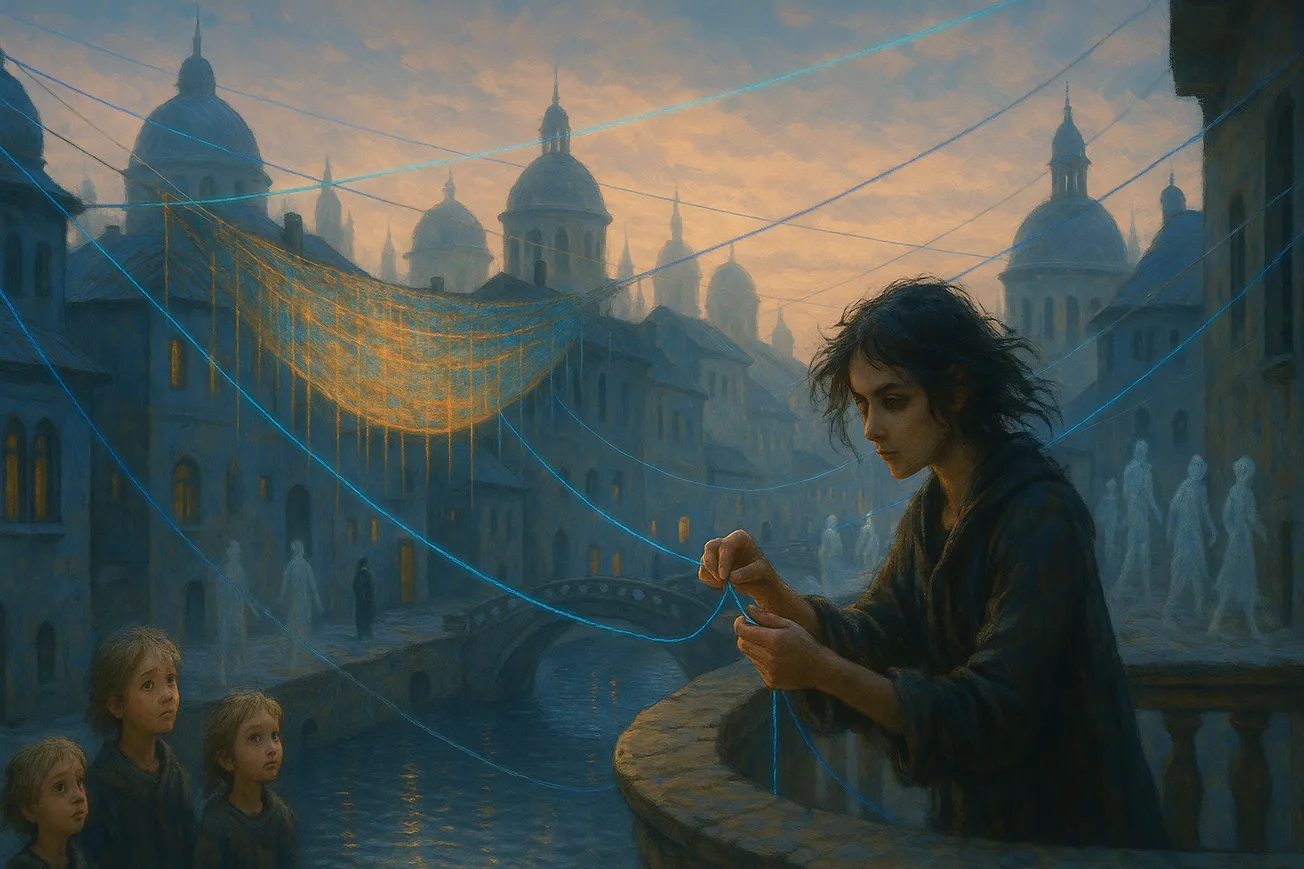🌈 The Fractal Story Engine | Body & Death | (21) BD-002-F1
In the Threaded Province of Velaran, bodies were considered looms and souls the weavers. Each morning, a spool of colored thread, visible only in dreams, dictated the weaver's next vessel. No one chose. No one stayed.
A baker might wake in the sinewed limbs of a fisher. A grieving widow might rise in a child’s uncreased skin, her grief curling like smoke through unknown joints. The switch lasted only until the second moon kissed the horizon, then each weaver returned, dazed, to the body that remembered only sleep.
This was called the Cycle. And to speak of the weavers aloud was to fracture it.
Except for one.
Linnet was born without a thread.
She awoke each day in her same body. Same bones, same laugh. The elders called it a defect, a knot in her soul’s rhythm. But others whispered, when the tea was bitter and night pressed close, that she was a fixed point in a world of spinning mirrors.
Linnet never wandered. Instead, she watched.
And she noticed.
One day, a market girl opened her stall with trembling fingers. The day before, those same fingers had carved bone flutes beside the waterfall cliffs. A monk refused to chant in the temple because he could no longer bear the sound of his own voice. A mother braided her child’s hair in a pattern unfamiliar to her hands.
Linnet saw them all. She saw that the Cycle was not seamless.
She began to stitch her own map.
Not with ink. With fruit skins, shadow-scraps, and broken threads she begged from the town’s sleep-weavers. Each stitch marked a transfer. She wore it beneath her tunic, a growing tapestry that bloomed like strange fungus across her ribs.
Then came the blue thread.
It was knotted to her pillow one morning, though she hadn’t dreamed. It pulsed faintly, like it breathed. When she touched it, nothing changed. But when she wrapped it around her wrist, she heard music she had never known she’d forgotten.
The next morning, she woke in someone else.
She was taller. There were scars on her knees. Her eyes pulled the world into sharper focus, as if it had always been slightly out of tune.
She tried to scream, but the voice that came was too beautiful to shatter.
All day she walked the edges of the city, listening to the hush of canals, the cough of birds, the distant drumming of shoes she didn’t recognize. Her hands acted on their own, feeding pigeons, weaving a small net, scratching a name into a stone with a fingertip.
She did not return to her own body that night.
Nor the next.
The blue thread was gone.
Somewhere, the weaver whose skin she wore was surely searching. Or perhaps not. Perhaps the switch was only hers. Perhaps she had taken.
The days curled forward. New shapes arrived.
She was a blind cartographer who mapped by scent. A glassblower with no tongue. A thief who kissed every mirror she passed.
Always a day, never a return.
Her tapestry stretched beyond her skin now. She hung it between rooftops. It flapped in the sun like a breathing manuscript. Passersby mistook it for art. Children whispered stories about the Threadwitch.
One child, bold and clumsy, dared climb to her perch.
“I saw my mother’s body walk without her,” he said. “She came home with no song. Just water in her eyes.”
Linnet nodded.
The boy reached into his coat and pulled out a green thread, frayed at both ends. “Will you take mine?” he asked.
She didn’t answer.
Instead, she wound the green thread beside the others. It shimmered, briefly, then vanished.
That night, she dreamt of salt. The next morning, she woke in a body already dying.
It was old, deeply worn, heavy with half-finished goodbyes. The bones hummed with absence. The heart ticked in irregular Morse. The hands held nothing.
But the breath moved steady.
And as she exhaled, it became music again.
A final thread, golden and lightless, wrapped itself around her ankle.
She followed it down.
She followed it home.
And when she reached the end, there was no mirror, no return, no knowing.
Only the loom.
And a voice, not hers, not anyone’s, asked without sound:
Will you stay and weave? Or wander until the weave forgets you?
She threaded her answer into the empty shuttle and waited.
The tapestry moved.

